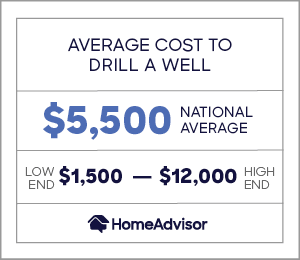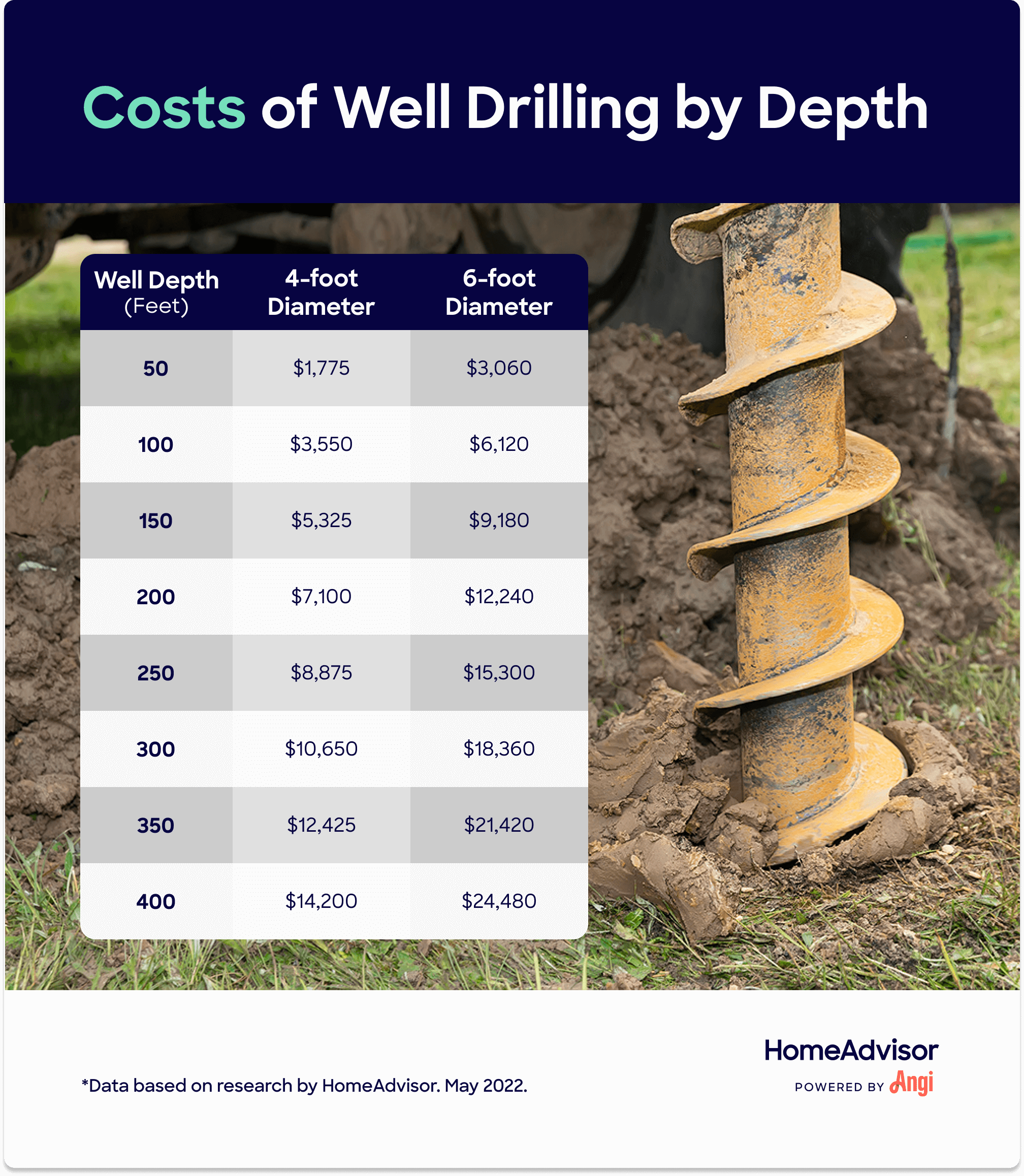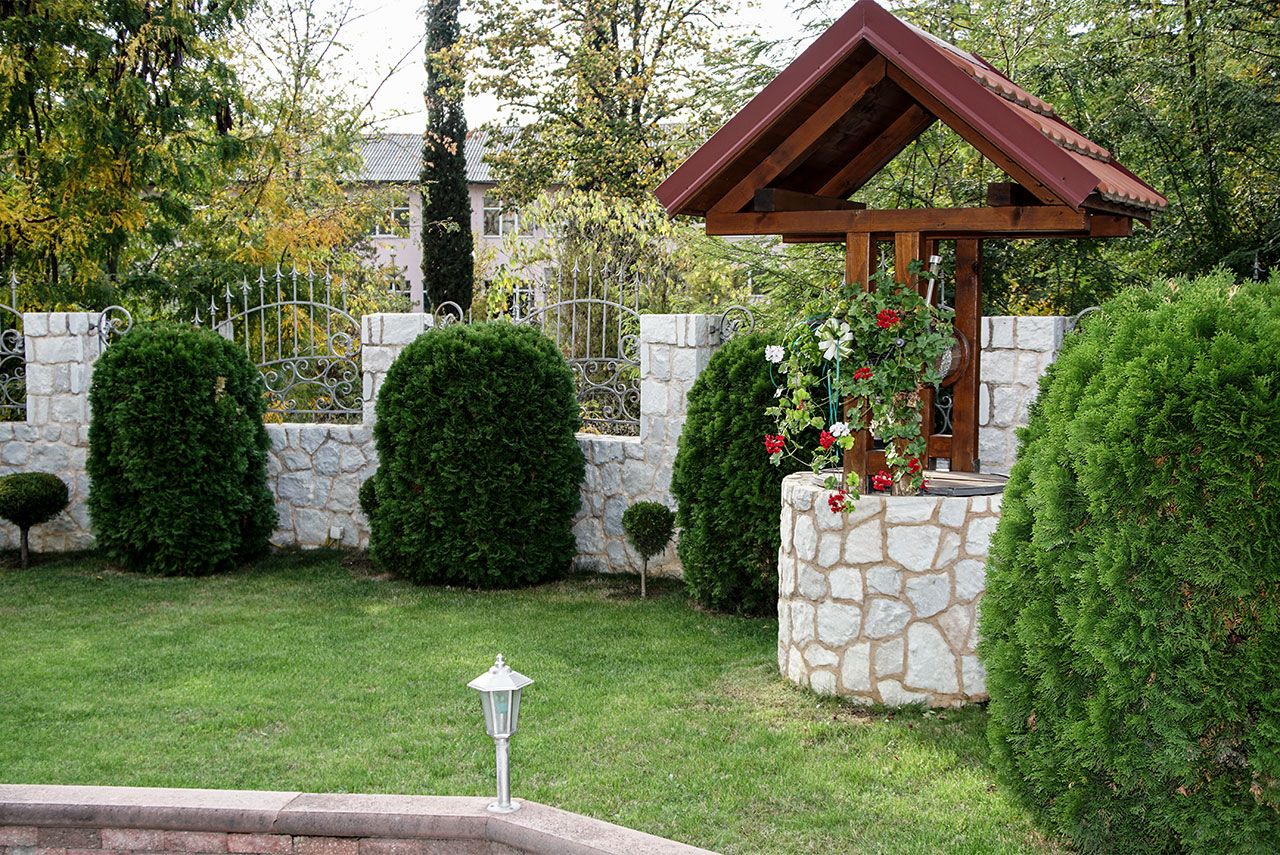How Much Does it Cost to Drill or Dig a Well?
Typical Range:
$1,500 - $12,000
Typical Range:
$1,500 - $12,000
Cost data is based on research by HomeAdvisor.
Updated August 2, 2022
Reviewed by Jeff Botelho, Licensed Journeyman Plumber.Drilling a well costs $5,500 for an average depth of 150 feet. Most projects range between $1,500 and $12,000. Expect to pay between $15 and $30 per foot of depth, or up to $50 for difficult terrain. For shallow depths, digging may be a more affordable solution at $10 to $25 per foot.
Digging a well costs about $10 to $25 per foot. Drilling increases that price to $15 to $30. These only include the digging or drilling process itself, not any extra work or equipment.
Digging is commonly used for shallow depths. For depths approaching 100 feet or more, digging isn't enough. Difficult terrain such as rocky soil might require drilling regardless of depth.
Residential projects tend to be less expensive. Drilling costs between $15 and $30 per foot, before considering additional installation needs. Small wells are more loosely regulated than the systems discussed below.
The process is straightforward. After boring the hole, it needs to be cased and connected to your water lines. Deep holes may require multiple drill bits to account for changing soil and rock types. Casing the hole and connecting to your water line increase expenses, but most pros account for multiple drill bits in their initial quote.
Shallow wells cost between $1,800 and $3,000, with most people paying around $2,400. This equates to between $5 and $10 per cubic yard. Shallow wells tend to be between 25 and 50 feet deep and measure between 3 and 10 feet in diameter.
While they're a cost-effective option in areas without bedrock and many large rocks in the ground, they're also notoriously difficult to protect from contamination and produce less yield than full-depth wells.
Per foot, expect to pay between $35 and $55 for agricultural and commercial uses. These costs are for drilling only but do account for the more complex process.
The borehole must be larger and is often deeper to account for more volume. Water quality regulations vary from state to state and can be very strict, requiring extra purification measures.
Using an aquifer instead of an electric pump will cost between $25 and $45 per foot for the drilling. This artesian system takes advantage of rock layers that confine water under pressure. The well releases that pressure, causing the fluid to rise naturally.
Low maintenance and operation expenses offset initially high costs as you will not need a pump or electricity to operate it. The process is similar to residential and commercial but needs the perfect location and careful drilling.
| Material / Appliance | Unit | Labor |
|---|---|---|
| Casing Pipe | $630 – $2,400 | $200 – $600 |
| Pressure Storage Tank | $1,400 – $2,400 | $200 – $500 |
| Water Treatment or Purification | $800 – $2,600 | $200 – $400 |
| Water Heater | $730 – $5,300 | $270 – $520 |
Geothermal drilling costs $20 to $40 per foot for the initial hole. However, it requires a different process to draw up geothermal energy. A specialized geothermal drill rig will be necessary. The hole must be at least 150 feet deep.
In total, a geothermal heating system installation costs between $12,000 and $38,000, which includes the well. This is the total cost for a new installation. Every 500 square feet in your home will need about 200 feet of depth to heat. For homes above 1,000 square feet, you might need two wells.
At $200 to $1,500, a sand point option is significantly less expensive than its alternatives. However, this hand-driven option is also less reliable. It's best for intermittent use, not your regular water supply or commercial irrigation.
| Material / Appliance | Unit | Labor |
|---|---|---|
| Hand Pump | $150 – $500 | $50 – $150 |
| Small Water Tank | $700 – $1,500 | $150 – $340 |
Even a small water tank is optional. Some homeowners use this option only to water their gardens or other purposes as needed.
Agricultural projects tend to be more expensive. Residential irrigation options cost between $5,000 and $12,000. Large, commercial drilling can be as much as $75,000. Price factors to consider include:
| Material / Appliance | Unit | Labor |
|---|---|---|
| Well Pump | $300 – $1,200 | $50 – $200 |
| Casing Pipe | $630 – $2,400 | $200 – $600 |
| Pressure Switch & Electrical Wiring | $50 – $150 | $160 – $500 |
| Pressure Storage Tank | $1,400 – $2,400 | $200 – $500 |
Only low water quality requires a treatment system. You will not need to heat the water in most cases.
You might be looking to increase the depth of your existing well. This can increase water volume or improve your heating source. Cost per foot tends to remain the same as each of the alternatives above. Depending on the additional depth, a pro can complete the project in a single day for $300 to $600 in labor plus materials.
The range of $1,500 to $12,000 makes more sense once you break it into its components. Drilling is only the beginning. You also must consider everything that comes after the hole.
| Material / Appliance | Unit Cost | Labor Price |
|---|---|---|
| Well Pumps Cost | $100 – $1,200 | $50 – $200 |
| Casing Pipe | $630 – $2,400 | $200 – $600 |
| Pressure Switch & Electrical Wiring Costs | $50 – $150 | $160 – $500 |
| Pressure Storage Tank | $1,400 – $2,400 | $200 - $500 |
| Water Treatment & Purification System Costs | $1,000 – $3,150 | $200 – $400 |
| Water Heater Prices | $850 – $1,650 | $270 – $520 |
On its own, installing a septic system costs between $3,300 and $10,600, with an average around $6,800. Total expenses for well and septic system drilling and installation range between $5,000 and $22,500. Some, but not all, well installation professionals can also drill and install this type of system.
A septic system helps you safely clean and dispose of wastewater. This option is necessary if you plan to live off the grid. A well gets you clean water, and the septic system disposes of it. Within the overall cost, an underground tank and soil absorption system are the biggest price factors.
The wide range of $1,500 to $12,000 shows how many factors influence project expense. You must consider the depth and location, distance to your home, permits, water testing, and other variables.
Because most averages depend on depth, this is the biggest variable. Most projects drill between 100 and 400 feet. If groundwater is close to the surface, you might only need a 25-foot depth.
Shallow water sources are more easily contaminated. Local authorities often regulate the necessary depth. Talk to an expert to find the ideal depth for your home.
The quality of your soil can significantly increase expenses, up to $50 per foot of drilling. Your geographic location often determines that quality. Lower water levels require deeper holes, also raising expenses. Average prices differ by state:
California: $25–$50 per foot
Colorado: $20–$40 per foot
Florida: $15–$30 per foot
Montana: $25–$45 per foot
Oklahoma: $20–$40 per foot
Texas: $30–$55 per foot
Washington State: $30–$50 per foot
Wisconsin: $20–$45 per foot
Wyoming: $30–$50 per foot
Permit fees depend on your county and range from $5 to $500. This is an essential cost before you start digging. Without a permit, you could risk legal trouble.
Most contractors help in the permitting process. In some counties, fees for residential and irrigation permits differ. In other areas, multiple permits may be required, like a plumbing permit for tying the well to the domestic water system inside the home. Work with your expert throughout this process to get the paperwork right.
Digging or drilling close to your home reduces the price tag. Waterline and electrical supply lines are shorter. Given the average cost to install a water main, every foot closer to your home saves between $50 and $150 for pipes alone.
Testing your water ranges between $30 and $150 for a DIY kit, or $100 to $500 when hiring a pro. It's a necessary first step to make sure the water is safe. You need to make sure your water is safe and clean.
Most pros will include this cost in their initial site inspection. They draw samples and submit them to a lab for thorough analysis. DIY kits typically show instant but less reliable results.
Soil condition has a distinct impact on the price you'll pay to drill your well. Soft, loamy soil with minimal rocks and debris costs considerably less to drill through than very rocky and heavily compacted earth.
If your well has to be drilled through hard rock, again, expect to pay considerably more. However, in this scenario, you'll save some money because you won't require a well casing, as hard rock supports itself.
Drilling through dense rock typically costs 155% more than drilling through soft soil, and partially rocky terrain costs 92% more.
The initial investment is higher, but a private well can result in savings over time. Monthly, you will only have to pay for the electricity to operate the pump. You also need to account for annual maintenance of $100 to $250.
With an average use of 12,000 gallons per month, a private well can save you up to $500 per year. Your utility costs are also more stable. Even if you use more water in a month, you will not pay more as you would on your municipal bill.
As septic tanks and wells age, their expenses increase. Every 20 to 30 years, you'll pay up to $10,000 to replace the water tank, pump, and more.
Technically, you can install a well yourself. But costs quickly add up, and safety becomes a problem. If you do decide on DIY construction, expect to pay for a few individual factors:
Renting a Drill Rig: $600–$800 per day.
Casing, Pipes, and Tubing: $50–$150 per foot of depth.
Other factors mentioned above will also raise expenses. Permit, pump, and water tank all cost extra. Hiring a well drilling pro ensures proper installation and makes the price more reliable. Making sure that the drilling and installation are correct also saves on long-term expenses. Get multiple quotes to better understand the prices for your situation.
Your well should be at least 100 feet deep so ground filtration can remove as many impurities as possible. As a rule, the deeper the well, the higher the drinking water quality. This is especially true for properties sitting atop particularly rocky areas, or homes in parts of the country with deeper water reserves.
Wells have a relatively long lifespan of 20 years or more, with many lasting between 30 and 50 years. Still, you must remember that precipitation levels and your well’s source largely determine how long your well will last. Leaks also occur, so be sure to inspect regularly and make repairs as soon as possible.
You can expect to pay between $150 and $350 annually to maintain your well. It's advisable to also book an annual well inspection, which costs between $100 and $150. Yearly inspections ensure your entire well system is in peak condition and can reduce the likelihood of pump failure and expensive repair bills.
Ask as many pertinent questions as you can until you find a well-drilling company to answer all of your questions to your satisfaction. Top questions to ask well-drilling companies include:
What's the recommended depth of a water well in my area?
How will you know if there's water below the drill site?
Does the cost to drill the well include the cost of the well casing?
Does the project cost include the pump, pressure tank, and the complete system installation?
How long is the warranty period for the work?
If the first drilling fails to reach water, do you cover the cost of drilling a second time?
Is the estimate a fixed price?
Can you provide references?
Can you provide evidence of your license, bond, and insurance?
Do you take care of the relevant permits?
How long will the project take?
Look for areas with little or no rocks and that require little or no clearing; you want relatively easy access to groundwater. Be sure to drill far from septic systems or animal pens. Once you’ve identified where you’d like to dig, be sure to contact your local permitting office to ensure you and/or your well installation professional have the proper documents and meet all local regulations.


